Steve Sabol, the President of NFL Films, passed away Tuesday. He died of cancer, and is survived by his father Ed Sabol. I was surprised when Ed, the founder of NFL Films, was inducted into the NFL Hall of Hame last year. Why was this guy — not even a broadcaster but a filmmaker — being inducted into the Football Hall of Fame? Sabol’s induction into Canton was recognition by the NFL of the importance of interpretation.
Football is still a new sport, and the fact is that playing the games didn’t build the industry, or the sport; creating a mythology around the teams, and the players, did. Sabol’s ESPN obituary actually quotes Sabol as saying that his job wasn’t only to nurture the game’s traditions, but to develop it’s mythology.
I’ve written about how the arts are part of politics, and the arts also have their own politics. Alexis Clements recently published an excellent piece in Hyperallergic noting how the non-profit industry fails at critiquing itself. Clements’s piece, titled, It is Broke, We Should Probably Fix It, critiques the non profit industry in several ways, including by noting that non-profits “are faced with a completely unsustainable and fickle funding structure that favors those who can craft the best language each year, above those who do the most work or actually succeed in serving their communities, even if on a modest scale” and earlier in that same paragraph she writes, “this leaves like-minded organizations who could form alliances or pool resources feeling an intense need to protect their turf, so to speak, by scrambling to undercut and out-metric one another .” I disagree that the corporate structure is to blame for mission creep, or mission failure, as Clements’ suggests, but I do think mission-based organization funders need to really embrace that the arts of today are grown in the soil fertilized by yesterday’s ashes. Great critics know that, and help that along. (In my mind, Lewis Segal’s Five Things I Hate About Ballet is actually a piece of arts advocacy writing.)
In an interview I did with the critic Suzanne Carbonneau several years ago she spoke about how Merce Cunningham’s dances inspired her to understand her world, and that inspiration to understanding is the critical connection between the humanities, and the arts, in entertainment. Sometimes that connection is positive, and sometimes it’s not, but the humanities side of the arts is a critical value for a functional whole community. As Walt Whitman wrote, “to have great poets there must be great audiences.”
When we talk about art critics its easy to think in terms of coverage or reporting. But when we talk about the importance of art critics we miss the real value of worthy myth-spinners, like Steve Sabol, and Alan Kriegsman. Alan Kriegsman wrote for the Washington Post and other publications at a time when the dance community in Washington, D.C. was maturing. Not only did Alan critique and support artists, he also grew participation in the dance community by helping grow its mythology.
Alan Kriegsman passed away three weeks ago, having passed the torch to a handful of worthy successors, but as the Post and similar publications keep thinning their beat, the question grows: how will we develop great audiences? How will the arts and humanities connect in this next generation?





